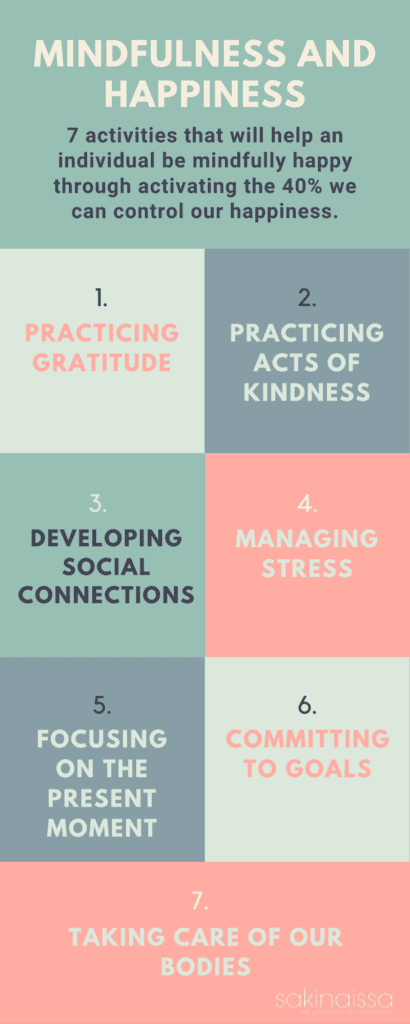In our previous article, Choose Happy, we mentioned the theory that genetics plays a role in happiness. People are born with a certain happiness “set-point.” That feature we are born with accounts for around half of our total achievable happiness level. A practice we can learn, Happiness Mindfulness, can boost our set-point and help make us happier.
In 1978, a team of psychologists from Northwestern University and the University of Massachusetts published a study in the Journal of Personality and Social Psychology that revealed that your genes establish the amount of happiness you have within you. So, even when unfortunate, stressful, or life altering events happen, our brain chemistry will shift back toward their innately more-or-less-joyful nature within months. But, the good news is, new research suggests that with steady mindfulness practice you can change that inborn set-point.
Happiness mindfulness practices can help us to increase our ability to regulate emotions, decrease stress, anxiety and depression. It can also help us to focus our attention, as well as to observe our thoughts and feelings without judgment. It can also help reset our happiness set-point, actually enabling us to be happier. As we become increasingly present in life and in relating to others, we make better decisions and manage our emotions.
Mindfulness and Happiness = Synergy!
So data shows us that the keys to happiness – to true well-being and fulfilment – depend not on the external circumstances of our lives, but on the state of our minds and the quality of our consciousness. People who focus on their present moment experience (in other words, people who were being ‘mindful’) are significantly happier than people whose minds wandered away from the moment.
One of the most popular ways of learning mindfulness is through the practice of meditation. We start by focusing on your breath, on a conversation, on an event. When we notice our mind has wandered, as it will (that’s what the human mind does), we simply and gently bring our attention back. Then we do this over and over again. It’s brain training!
If you can practice meditation daily, even for a few minutes, you can make improvements to your mind and body. As we discussed previously meditation can help things such as anxiety, quieting mental chatter, improving focus, and increasing self-esteem and confidence.
Mindfulness Tips
Here are three simple steps from Neurotrition to begin working on mindfulness. Start small a little mindfulness every day:
- Just Breathe: By simply focusing your attention on your breathing, and without doing anything to change it, you can move in the direction of relaxation. Ok Get in the habit of shifting your awareness to your breath whenever you find yourself dwelling on stressful situations.
- Mindful Meals: Practicing mindfulness while eating can help increase immune functions. Chewing food more helps release nutrients from food more efficiently affecting everything from absorption and digestion to gut signaling. Take smaller bites, eat slowly and focus on attributes of foods like color, taste and smell.
- Walking Meditation: Evidence suggests that mindfulness increases the more you practice it. So, just getting outside for a peaceful walk for 10 minutes a day could really help. Walking meditation involves paying deliberate attention to something you would normally do automatically, such as the movement of your feet and legs, or whatever your eyes take in as they focus on the world in front of you. Don’t enjoy walking meditation? You can bring the same degree of awareness to almost any activity from running to brushing your teeth. Choose one daily activity to focus on and give it a whirl! – Rebecca McKinty Neurotrition

The self-awareness generated through meditation can help you see when you’re engaged in the kind of worrying and hand-wringing that’s a waste of your time and energy. When the highs are higher and the lows aren’t as low, your set-point goes up…your overall level of personal satisfaction is higher. – Gigi Faulk
Try using mindfulness either alone or with other meditation techniques. Mindfulness is commonly defined as “paying attention in a particular way, on purpose, in the present moment, non-judgmentally.” By practicing mindfulness while including meditation, you can train your brain to increase your happiness set-point.
As with most things, changing your set-point will take work. We have previously talked about the many kinds of mindfulness you can practice. All of them can help with self-awareness, focus and happiness. Find one that works for you and begin. Or, reach out for help to find a way to increase your happiness.
* Please leave a comment below. You may comment anonymously or you may use your first name. We may post or quote your comment on the website. We will never post or share your last name, email address or any other personal identifying information.
